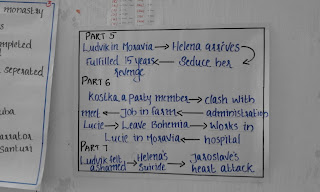Edmund Wilson
MARXISM AND LITERATURE
Notes: main points of the essay
(Please note this is not
a substitute for the original work)
Meant for S2 MA English Students under Calicut University
·
It opens with a question on the role
assigned to literature and art in the system of dialectical materialism
·
All activities incorporated at the
“superstructure” level were possibly to
be explained in terms of economics
·
There could be a reciprocal interaction,
according to Engels, wherein which a great artistic period can influence to its
very economic foundations
·
Marx and Engels never tried to give a
socio-economic formula to test the validity of work of art
·
According to Edmund Wilson, they tried
to respond to creative works based on their merits
·
They never judged literature in terms of
its political tendency
·
They appreciated Aeschylus, Goethe and
Shakespeare
·
Marx wrote that “ certain periods of
highest development of art stand in no direct connection with the general
development of society nor with the material basis and the skeleton structures
of its organization
·
Lenin appreciated music, fiction, poetry
and theatre
·
Trotsky in his book “Literature and
Revolution” discusses about the ‘carry over’ value of literature
·
Trotsky asserts that terms such as
“Proletarian literature” and “Proletarian culture” are dangerous, because they
erroneously compress the culture of the future into the narrow limits of the
present day
·
Trotsky believed that the proletarian
dictatorship was not to last. It was to be only a transition phase and to lead
the way to a culture which is above classes and which will be the first truly
human culture
·
The situation in Russia had changed in
between the pre-revolution days and the post revolution days
·
The masters of fiction and theatre,
during the Tsar days, use the art of implication to perfection
·
The overt identification of politics
with literature led to terrible abuses
·
Under the Stalin administration, having
a mass of people who were eighty percent illiterate, a critical review of what
was being created in literature, was impossible
·
With contradictory reports emerging on
various political issues, provided by the administration, the intelligentsia
preferred to remain silent
·
In this context, Edmund Wilson opines
that Marxism by itself can tell us nothing whatever about the goodness or
badness of a work of art
·
He complains that the Leftist critic
with no literary competence is always trying to measure works of literature by
tests which have no validity in that field
·
No creative work is possible through
legislation or prescription
·
There is always a futility to make art
an effective instrument in class struggle
·
Edmund Wilson proposes two terms; short
range literature and long range literature
·
Long range literature attempts to sum up
wide areas and long periods of human experience
·
Short range literature preaches and
pamphleteers with the view to an immediate effect
·
According to Edmund Wilson, highly developed forms of
literature require leisure and a certain amount of stability
·
The conditions that make possible the
masterpieces are apparently not produced by the impending revolution, but by
the phenomenon of literary technique in the hands of a writer who has had the
support of long enduring institutions, reflecting an age of transition
It is society itself,
says Trotsky which under Communism becomes the work of art Source: David Lodge(ed.). Twentieth Century Literary Criticism reader, London, Longman, 1972.


Comments
Post a Comment